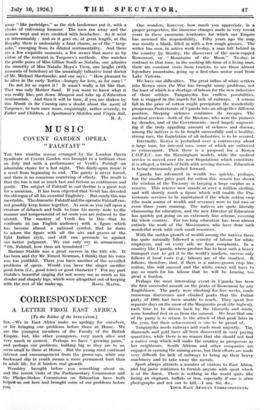CORRESPONDENCE
A LETTER FROM EAST AFRICA
[To the Editor of the SPECTATOR.] SIR,—We in East Africa make no apology for ourselves, or for bringing our problems before those at Home. We are the youngest members of the Family of the -British Empire, but, like other youngsters, very much alive and very much in earnest. Perhaps we have "growing pains," and perhaps our problems, bulking big as they are to us, seem small to those at Home. But the young need continual interest and encouragement from the grown-ups, while any backward slip in youth means a more permanent hurt than in adult life, for it hinders real growth.
Wembley brought before you something about us, and the recent visits of the Parliamentary Commission and the Phelps-Stokes Commission on Education have both helpe44as out here and brought some of our problems before you.
One wonders, however, how much you appreciate, in a proper perspective, the immense changes made in very recent Years in these enormous territories for which our Empire has assumed the responsibility. Fifty years ago the map was mostly a blank, filled in with a few rough guesses. The writer has seen, in active work to-day, a man left behind in the country by Stanley, the discoverer of the snow-capped Rowenzori, or "Mountains of the Moon." To-day, in contrast to that time, in the working life-time of a living man, there are constant visits from tourists, to see those almost legendary mountains, going up a first-class motor road from Lake Victoria.
We have our difficulties. The great influx of white settlers into Kenya since the War has brought many problems, not the least of which is a shortage of labour for the new industries of those settlers. Tanganyika has endless possibilities, but is stopped in the march for lack of railways. A serious fall in the price of cotton might precipitate the wonderfully prosperous Protectorate of Uganda into an altogether different position. Sleeping sickness continues its ravages. The medical services—both of the Missions, who were the pioneers by decades, and of the Governments—need largely augment- ing if the truly appalling amount of sickness and disease, among the natives is to be fought successfully and a healthy, strong race, the foundation of all industries, is to be secured.
Internally, Kenya is perturbed over a controversy about a large loan, for internal uses, some of which are criticized as extravagant. Then there is a proposal for a Kenya C.O.P.E.C. (on the Birmingham model), while the medical service is moved over the new Regulations which constitute it is alleged, a breach of faith with serving doctors. Education is being strenuously pushed forward.
Uganda has advanced in wealth too quickly, perhaps, but the smaller price paid for cotton this season has shown the wisdom of the Treasury in keeping a large surplus as a reserve. This reserve now stands at over a million sterling, and will shortly reach a figure which will enable the Pro- tectorate services to be maintained if the whole cotton crop (the main source of wealth and revenue) were to fail two or even three years running. The natives are quite literally clamouring for education, and the new Director of Education has quickly got going on an extremely fine scheme, covering the whole country. For too long education has been almost entirely the work of the Missionaries, who have done such wonderful work with such small resources.
With the sudden growth of wealth among the natives there has quite naturally followed a scarcity of labour for white employers, and on every side we hear complaints. In a country like Uganda, where produce has to bear such a heavy transport cost to get it to the world's markets, success only follows if local costs (e.g., labour) are of the smallest. It follows, therefore, that, if there is a native-grown crop like cotton, this will succeed and the white owner will have to pay so much for his labour that he will be bearing too great a burden.
Perhaps the most interesting event in Uganda has been the first successful assault on the peaks of Rowenzori by any Englishmen. The party were climbing for five weeks, made numerous discoveries and climbed peaks that the Italian party of 1900 had been unable to reach. They spent five separate days on the snow of the Marguerite peak (the highest), each time to be driven back by the blizzards and mists, some hundred feet or so from the summit. We hear that one of the party is to return to the attack of that peak later in the year, but their achievement is one to be proud of.
Tanganyika needs railways and roads most urgently. Tin, diamonds and gold have all been discovered in very paying quantities, while there is no reason that she should not find a native crop which will make the country as prosperous as her neighbours. South African and other companies are engaged in opening the mining areas, but their efforts are made very difficult for lack of railways to bring up their heavy machinery and to take away the metals.
Sport always attracts a number of visitors to East Africa, and big game continues to furnish anyone with sport which is of the finest. There is nothing in the world quite like facing an elephant, buffalo or lion, especially if one is after photographs and not out to kill.—I am, Sir, &c.,
Youa EAST AFRICAN CORRESPONDENT.










































 Previous page
Previous page